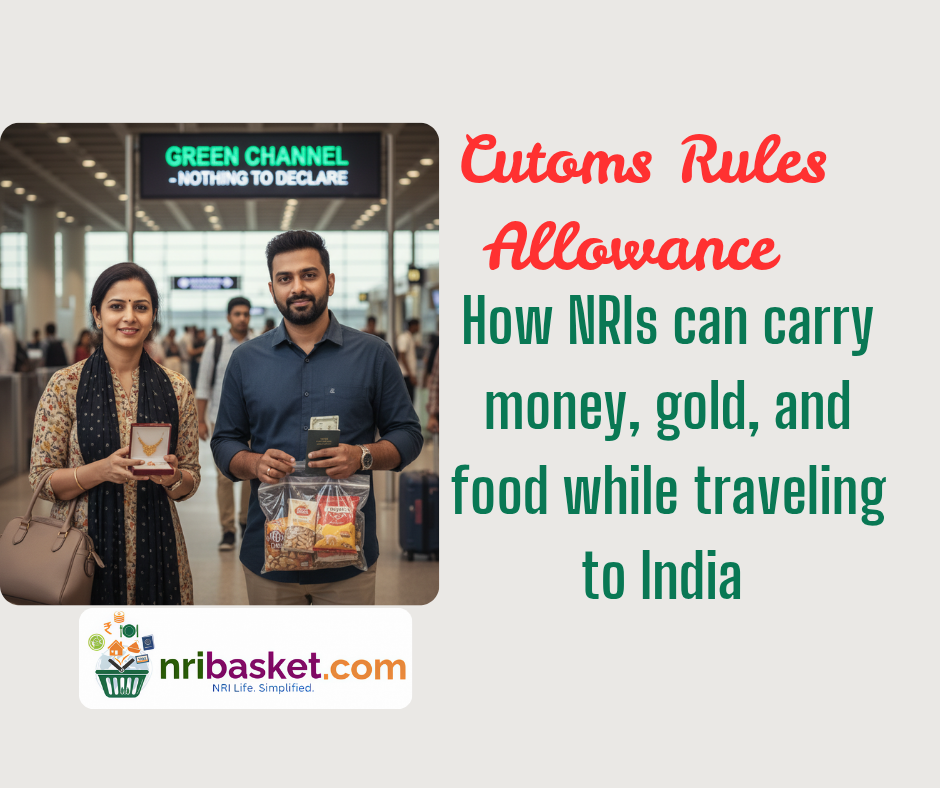
India Customs Rules 2026: Avoid Fines & Seizure at Indian Airports
Introduction
Welcome to the definitive guide for Non-Resident Indians (NRIs) traveling to India. Navigating Indian Customs regulations can often feel complex, especially when carrying valuables like money, gold, and familiar food items. Whether you are returning for a short visit or for permanent settlement, knowing the precise rules on declarations, duty-free allowances, and prohibited goods is crucial for a smooth and penalty-free arrival. This comprehensive guide breaks down the essential customs rules governing foreign currency limits, the specific weight and value caps for duty-free gold jewellery, and the guidelines for bringing in food items for personal consumption. Read on to ensure you are fully prepared to pass through the Green Channel with confidence.
India Customs Rules 2026: Your Essential Guide to a Smooth Airport Arrival
Don’t let confusing customs rules ruin your trip. Our updated 2026 guide helps you avoid penalties, fines, and the seizure of your goods at Indian airports.
⚠️ A Costly Assumption
Many travellers land in India assuming their personal belongings are always safe from Customs scrutiny. That assumption can be very expensive. Indian Customs rules apply the moment you land, and several common items can attract customs duty, penalties, or even seizure if you’re unaware of the regulations.
What Travellers Often Get Wrong About Indian Customs
- No allowance for some items: Certain items have no duty-free allowance at all.
- Electronics declaration: Some electronics must be declared even if you’re carrying only one unit.
- Allowance is not a right: Personal allowance is not a guaranteed right and is subject to official discretion.
- Severe consequences: Non-declaration can lead to heavy fines, confiscation of goods, and lengthy questioning.
🔑 The Golden Rule for Every Traveller
When in doubt, declare it. Transparency with Customs officials is always cheaper and safer than facing penalties, seizure, or missing your connecting flight.
India Customs Duty-Free Limits & Rules (2026)
Use this table as a quick reference for the most common items. All values are subject to change; always verify with the official Indian Customs website before travel.
| Item Category | Duty-Free Allowance / Key Rules | Important Notes & Risks |
|---|---|---|
| Gold Jewellery | Up to 20g (₹50,000 approx.) for men Up to 40g (₹1,00,000 approx.) for women |
Must be for personal use and carried in passenger baggage. Exceeding limits attracts customs duty (often around 10% + applicable cess). |
| Gold Bars & Coins | No duty-free allowance. Fully dutiable. | STRICT: The total limit for gold in any form is 1 kg per passenger. Beyond this can lead to seizure. |
| Silver | Up to 10 kg per passenger allowed. | However, silver is fully dutiable in all forms (bars, coins, jewellery). Duty must be paid on the entire value. |
| Foreign Currency | No limit on bringing it in. | CRITICAL: You must declare on the Currency Declaration Form (CDF) if total cash exceeds USD 5,000 (or equivalent) OR total forex (cash + TCs) exceeds USD 10,000. |
| Indian Currency | Up to ₹25,000 allowed for residents returning to India. | Strictly prohibited for foreigners to bring in/out Indian currency notes. |
| Mobile Phones | Generally, one used phone is allowed duty-free. | Carrying a new, sealed phone or multiple phones can be seen as commercial import. Duty may be levied if value > ₹50,000. |
| Laptops & TVs | One laptop as personal baggage is usually duty-free. | Televisions have no duty-free allowance. Customs duty is payable on even one TV. |
| Other Personal Effects (Clothes, cosmetics, etc.) | General free allowance for personal effects is up to ₹50,000 in value. | If the total value of goods (excluding items listed separately) exceeds ₹50,000, you must declare and pay duty on the excess. |
Critical Steps for a Hassle-Free Customs Clearance
1. Before You Land: Prepare Your Declaration
Fill out your Customs Declaration Form (usually provided on the plane or available at the airport) honestly and completely. Keep all high-value purchase receipts handy, especially for new items.
2. At the Red & Green Channels
After baggage claim, you will face two channels:
Green Channel (Nothing to Declare): Use only if you have no dutiable or restricted goods.
Red Channel (Goods to Declare): Use if you have any items exceeding limits, carrying new sealed items, or are in doubt.
3. The Final Decision Rests with Customs Officers
Remember, allowances are guidelines. The assessing officer has final discretion based on your declaration, the nature of the goods, their valuation, and your intent (personal vs. commercial). Politeness and honesty go a long way.
long answer: An NRI can bring in foreign exchange without any limit. However, a declaration must be made to Customs if the value of foreign currency notes exceeds US5,000 or equivalent, or if the aggregate value of foreign exchange (currency notes, traveler’s cheques, etc.) exceeds US10,000 or equivalent, using the Currency Declaration Form (CDF).
long answer: You must declare the foreign exchange on the Currency Declaration Form (CDF) upon arrival if the value of foreign currency notes exceeds US5,000 (or equivalent) or if the aggregate value of all foreign exchange (including currency, traveler’s cheques, bank notes, etc.) exceeds US10,000 (or equivalent).
long answer: Import of Indian currency is generally prohibited. However, passengers who are normally resident in India and are returning from a visit abroad are permitted to import Indian currency notes up to ₹25,000.
long answer: The Currency Declaration Form (CDF) is a form available with Customs that must be filled out by any passenger carrying foreign currency notes exceeding US5,000 or total foreign exchange exceeding US10,000 upon arrival in India. This declaration ensures compliance with foreign exchange regulations.
long answer: A male passenger who has been residing abroad for over one year is allowed to bring in gold jewellery duty-free up to a maximum weight of 20 grams, provided the total value does not exceed ₹50,000. This allowance applies to gold jewellery only.
long answer: A female passenger who has been residing abroad for over one year is allowed to bring in gold jewellery duty-free up to a maximum weight of 40 grams, provided the total value does not exceed ₹1,00,000. This allowance applies to gold jewellery only.
long answer: The specific duty-free allowance (20 grams for men, 40 grams for women) applies exclusively to gold jewellery. Gold in the form of bars, coins, or biscuits is excluded from the duty-free privilege and must be declared, with customs duty paid.
long answer: An Indian passenger who has lived abroad for at least one continuous year can bring a total weight of gold (including jewellery, bars, coins, etc.) up to 1 kilogram, but anything beyond the duty-free jewellery limits is subject to the applicable customs duty (which is generally 13.75% for stays over 6 months).
long answer: To be eligible for the duty-free gold jewellery allowance (₹50,000 for men, ₹1,00,000 for women), the Indian passenger must have been residing abroad for a continuous period of over one year.
long answer: For stays abroad of less than six months, there is no duty-free allowance for gold, and all gold brought in (including jewellery) is typically subject to a customs duty rate of 38.5% inclusive of all charges.
long answer: Children who have resided abroad for over a year are also eligible for the duty-free gold jewellery allowance, with limits of up to 20 grams (max ₹50,000) for a boy and up to 40 grams (max ₹1,00,000) for a girl, similar to adult passengers.
long answer: While not all food items are prohibited, it is crucial to declare all food items you are carrying on the Customs Declaration Card to avoid issues, potential penalties, or confiscation, as customs officials need to screen for restricted or prohibited items.
long answer: There are generally no fixed quantity restrictions for non-commercial food items meant for personal consumption. However, it is highly recommended to carry a “reasonable” amount that aligns with personal needs. Carrying excessive quantities may lead to scrutiny or require justification.
long answer: Non-perishable and commercially packaged food items are generally allowed for personal consumption. This typically includes items like sealed snacks, dry fruits, spices, condiments, chocolates, and commercially packaged canned goods.
long answer: Fresh, frozen, or raw meat/meat products, unpasteurized dairy products, fresh fruits, and vegetables are typically restricted or prohibited to prevent the introduction of pests, diseases, or contaminants. Homemade foods may also be restricted unless properly sealed and labeled.
long answer: Homemade foods are generally discouraged or restricted unless they are properly sealed and labeled, as customs checks need to confirm contents and safety. Perishable food items are also generally not allowed due to the risk of spoilage and potential biological contamination.
long answer: To facilitate smooth customs clearance, food items should be sealed, in their original commercial packaging, and properly labeled with ingredients and expiry dates. This helps customs officials verify the nature and safety of the product.
long answer: Indian residents returning from abroad are generally allowed to bring in articles other than the special jewellery/gold allowance, up to a value of ₹50,000, carried on the person or in accompanied baggage, duty-free. This does not include items like large electronics (e.g., LED/LCD/Plasma TVs).
long answer: It is highly recommended to carry purchase receipts, certificates of authenticity, and ideally a jewellery appraisal from your country of residence. This documentation helps prove the value and ownership of the items, especially if the total value exceeds the duty-free limits, or if you plan to take the items back out of India.
long answer: If you are carrying any dutiable goods or goods that exceed the duty-free allowances (including gold that requires duty payment), you must proceed through the Red Channel to declare your items and pay the applicable customs duty.
long answer: If you are not carrying any dutiable or prohibited goods, and the value of your possessions is within the free allowance limits, you can proceed through the Green Channel. However, carrying undeclared dutiable/prohibited goods through the Green Channel can lead to prosecution and confiscation.
long answer: Goods carried over and above the general free allowance (like the ₹50,000 limit for general articles) are generally chargeable to customs duty at a consolidated rate of approximately 38.5% (which includes Basic Customs Duty, Social Welfare Surcharge, etc.)
long answer: One laptop or personal computer is generally allowed to be imported duty-free, provided its value is included within the passenger’s overall general duty-free baggage allowance (e.g., ₹50,000 for returning residents).
long answer: If you are an Indian national returning to India for permanent settlement and meet the “Transfer of Residence” criteria (e.g., minimum 365 days stay abroad during the preceding two years), certain used household articles and personal effects can be imported duty-free. However, major appliances and electronics may be subject to duty.
long answer: Failure to declare foreign currency or gold that exceeds the specified limits to Customs is a violation of the law. This can result in confiscation of the undeclared items, payment of heavy penalties, and potential prosecution.
long answer: Foreign exchange can be carried in various forms, including physical foreign currency notes, bank notes, traveler’s cheques, and other instruments like Forexplus Cards. The declaration limits (US5,000 for notes, US10,000 aggregate) cover all these forms.
long answer: Silver is generally allowed, but the duty-free allowance for silver jewellery is lower than for gold (e.g., ₹10,000 for a gentleman, ₹20,000 for a lady, for stays over one year). Silver in forms other than ornaments is dutiable and must be declared. The weight of silver should also generally not exceed 10 kgs.
long answer:28. While the rules mainly cover import, it is important to know that the export of antiques and artifacts more than 100 years old is strictly prohibited from India. If you bring an antique item, you must be able to prove its origin and compliance with international laws.
long answer: If you took jewellery or gold out of India, you should have obtained an Export Certificate (Jewelry/Valuables List) from Customs at the time of departure. Presenting this certificate upon re-entry will allow you to bring those specific items back without paying import duty, as they are considered personal re-imports.
long answer: If the value of your goods exceeds the duty-free allowance (e.g., ₹50,000 for general articles), the customs duty (generally 38.5%) is calculated and charged only on the excess value, not on the entire value of the goods.
long answer: Passengers aged 18 and above are allowed to import a limited quantity of alcoholic liquor (including wine and beer) up to 2 liters total, and tobacco products (200 cigarettes or 50 cigars or 250 gms of tobacco) within the duty-free allowance limits. Quantities in excess are dutiable at high rates.
long answer: The import of seeds, plants, and plant materials is strictly regulated by India’s Plant Quarantine (Regulation of Import into India) Order. Many items are prohibited or require a phytosanitary certificate and a special import permit to prevent the introduction of foreign pests and diseases.
long answer: Under the Transfer of Residence scheme, one unit each of certain major electrical appliances and electronic items (like VCD/VCR, Washing Machine, Personal computer/Laptop, Refrigerator up to 300L, Cooking Range) is allowed to be imported upon payment of a concessional customs duty (e.g., 15%). Other items may attract the normal duty rate of 38.5%.
long answer: The specific duty-free gold jewellery allowance (₹50,000/₹1,00,000 limit) is only for Indian passengers who have been residing abroad for over one year. If the total stay abroad is less than six months, no duty-free allowance applies, and a high duty (38.5%) is charged on all gold.
long answer: If the quantity of food items is deemed excessive and beyond “personal consumption” needs, customs officials may suspect it is for commercial resale. This could lead to the items being subjected to commercial import duties, requiring specific import licenses, or even confiscation.
Save This Guide Before You Travel!
Bookmark this page or share it with anyone flying to India. Staying informed is the first step to traveling safely and smartly.
Stay Informed. Travel Safe. Declare Correctly.
Disclaimer: This guide is for general information purposes based on rules prevalent in early 2026. Customs regulations can change. For authoritative advice, always refer to the official Central Board of Indirect Taxes and Customs (CBIC) website or consult a professional.
India customs rules 2026, Indian airport customs 2026, duty free limits India, gold jewellery limit India 2026, customs declaration India, customs penalty India, what to declare at Indian customs, laptop customs India, foreign currency limit India, Indian customs latest rules




